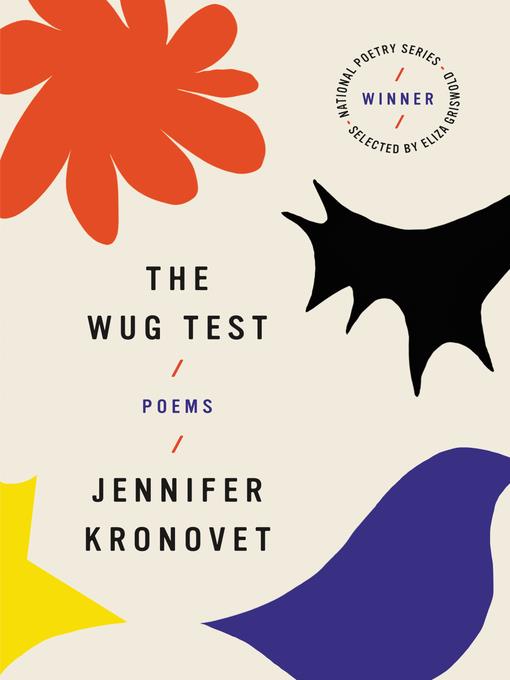
The Wug Test
Poems
کتاب های مرتبط
- اطلاعات
- نقد و بررسی
- دیدگاه کاربران
نقد و بررسی

September 19, 2016
Rigorously intellectual and compassionate in its approachability, this second collection from Kronovet (Awayward), a 2015 National Poetry Series winner, employs linguistics research to probe how language makes “the world a glass we fill by speaking.” Kronovet astutely observes how people “use words like a tree uses light:/ there is a process we don’t see but do.” It may go without saying that language shapes experience, and Kronovet’s poems are a vital reminder that the saying is all we have; that “Nothing stays inside the body forever.” There is a fierce and tender optimism in the notion that “a box can be// a word can be a ship can be/ the blank that takes us to each other.” Tenderness is at the core of these poems, and Kronovet turns over each word carefully as only an attentive lover of language can. “We made ourselves through words/ for each other for years. Like trees/ almost make the sky,” she writes, hinting at language’s limitations, yet choosing instead to offer admiration and awe: “This sounds/ much worse than it is. More like/ how the car makes the road./ Or the runner across the field,/ the park—I love him.” Even readers who tend to be skeptical of poetry collections that revolve around a project will be charmed by Kronovet.

October 1, 2016
The poems in National Poetry Series winner Kronovet's follow-up to Awayward, an A. Poulin Jr. Prize winner, at first seem to be about Victor, the Wild Boy of Aveyron. But gradually one realizes that the wild boy is a metaphor for Kronovet's son, and that the "Wug" of the title is the name of a test that studies language acquisition. As Kronovet looks at her son's first attempts to communicate and her response to these attempts, she writes about language and usage, as well as the history and derivation of words. She makes the abstract into the concrete through unusual, sometimes surreal metaphors, extending the meaning and distance of the lines with conceit. Her best poems work by innuendo and enjambment. "[I] wove city speech/ into the river./ So what," says one poem, and the next two stanzas describe the meaning implied in "so what," ending with the narrator "spitting/ out the river I'm not." Ultimately, Kronovet doesn't study the way people learn to speak using correct grammar and syntax as much as she immerses herself in what happens when people acquire language or, as she suggests, it acquires us. If nothing else, the focus on the boy humanizes the poems, keeping them from being just a clever exercise in scholarly wordplay. VERDICT Best for academic readers.--C. Diane Scharper, Towson Univ., MD
Copyright 2016 Library Journal, LLC Used with permission.

October 15, 2016
Developed by psycholinguist Jean Berko Gleason in 1958, the Wug Test evaluated children's ability to build language based on instinct and intuition by asking children to conjugate nonsense words ( This man zibs. A man who zibs is a _____ ). In this cartwheeling poetry collection, Kronovet explodes wugs and zibbers into a shimmering hodgepodge of acoustic revelry, questioning the very substance of language at every turn, invoking Noam Chomsky's theories of language acquisition, and poking fun at ToneCheck, software that edits e-mail for conflict-causing language. Kronovet composes extremely strange, phonic-rich sentences ( A manhole / has text that manifests / as a totem ); examines unique neologisms ( In Chinese, computer is electric brain. Movie is electric shadows ); and catalogs such borrowed words in English as ketchup, tycoon, and boondocks. Other unconventional poems include a frequency analysis of words in Awayward (2009), the poet's previous collection, and an annotated translation of Celia Dropkin's My Hands, composed originally in Yiddish. Kronovet joins poets like Cathy Park Hong, Melissa Range, and Noah Eli Gordon in creating alluringly odd, provocative, and perplexing work.(Reprinted with permission of Booklist, copyright 2016, American Library Association.)

























دیدگاه کاربران